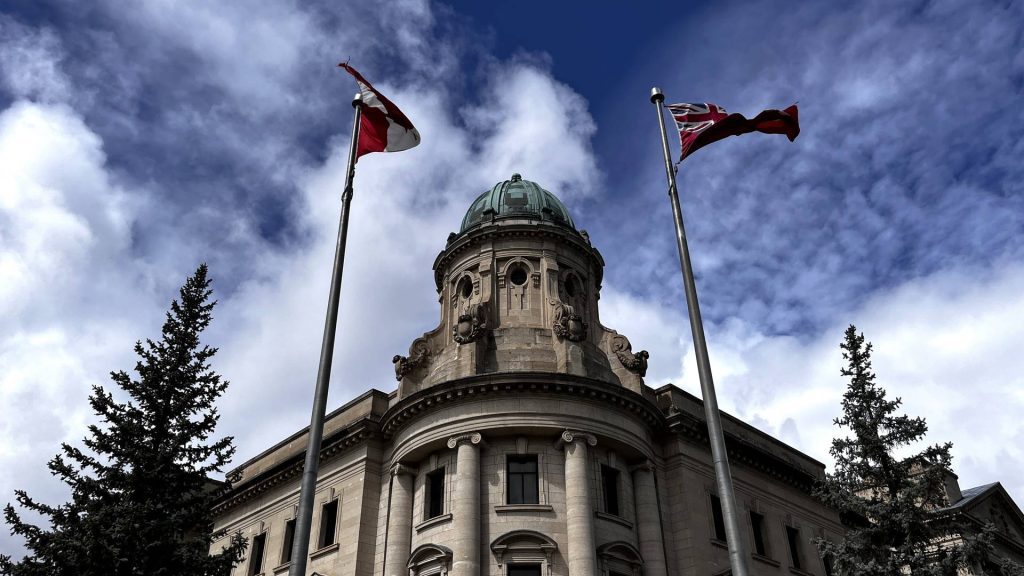
The Manitoba Law Courts building in downtown Winnipeg. Photo: APTN News
When the man who killed four First Nations women in Winnipeg is sentenced next week he’ll get an earful from their relatives and friends.
He’ll also hear how his crimes harmed their communities.
It’s the next phase in the trial of Jeremy Skibicki, 37, who was convicted July 11 of four counts of first-degree murder.
Skibicki targeted Morgan Harris, 39, Marcedes Myran, 26, Rebecca Contois, 24, and an unidentified victim Mashkode Bizhiki’ikwe (Buffalo Woman) at city homeless shelters in the spring of 2022.
He was found guilty of luring the victims to his apartment where he sexually assaulted and murdered them before defiling their bodies and disposing of the remains in nearby garbage bins.
“The facts of this case are mercilessly graphic,” said Court of King’s Bench Chief Justice Glenn Joyal in delivering his verdict.
“… and the unspeakable horrors that were unleashed in those four killings were admitted by the accused.”
The slayings shone a spotlight on Winnipeg’s already high number of missing and murdered Indigenous women and girls (MMIWG).
Read more:
‘Justice was served’: Killer of 4 women in Winnipeg guilty of first-degree murder
Something not lost on Joyal, who described the case “emblematic of much of what is associated with the tragedies that underlie the very grim reality of (MMIWG) in Canada.”
To that end, APTN News reviewed statistics that support Winnipeg’s reputation as the epicentre for MMIWG in Canada.
According to an analysis of media reports, APTN found Indigenous women accounted for 65 per cent of all female homicides in Winnipeg from 2018 to 2022.
In 2022 alone – the year Skibicki committed his crimes – the analysis showed Indigenous women were the victims in nearly 20 per cent of all homicides in the city while making up just six per cent of the population.
Also, Indigenous women accounted for every unsolved female homicide in Winnipeg between 2018 and 2022, the analysis showed.
Between 2012 – the year Skibicki said he first met Harris on the street – and the end of 2023, APTN found 15 Indigenous women went missing or were murdered in Winnipeg.
Ten of those women are still missing and five were murdered in cases that remain unsolved.
There is no evidence to suggest Skibicki was involved in any of these cases.
Read more:
For his penalty hearing, which is scheduled for August 28, Skibicki faces a mandatory life sentence and must serve 25 years before being eligible to apply for parole.
The judge can no longer impose consecutive parole ineligibilities for numerous murder convictions following a 2022 Supreme Court decision that determined the practice was cruel and illegal, said Peter Kingsley, executive director of Legal Aid Manitoba, which paid for Skibicki’s defence.
“… By effectively giving somebody a life-with-no-parole sentence it becomes cruel and unusual punishment, which is contrary to the Charter of Rights and Freedoms,” he explained in an interview.
Kingsley, who agreed to speak generally and not on the Skibicki case, said an offender convicted of one count of first-degree murder can apply for a “faint hope” hearing after serving 15 years but “they’re very hard to get.” Multiple murderers must wait 25 years, he said.
Kingsley noted the parole board makes its decision on release based on an offender’s in-custody behavior versus their continuing risk to the public.
“That is kind of the logic that the courts and justice system use, and it balances the overall hope that individuals will rehabilitate,” he said, while ensuring “individuals who commit the worst offence, which is murder, are kept in control of the state effectively for the rest of their lives.”
Meanwhile, mmbers of the Harris family view Skibicki’s conviction as only one part of achieving justice.
They are girding for the search of the Prairie Green Landfill in October for the remains of Harris and Myran.
Read more:
Community braces for serial killer’s sentencing hearing
Only Contois’ remains were recovered as part of the investigation, while the remains of Harris and Myran are believed to be in the landfill north of Winnipeg after Skibicki disposed of the bodies in a commercial dumpster near his home.
The search, funded by $60 million from the provincial and federal governments, is expected to continue until the remains are found, family members have said.
The family and the Assembly of Manitoba Chiefs, with support from the Assembly of First Nations, is also seeking an independent investigation into the deaths and a public inquiry into the circumstances surrounding the murders that would probe the actions and procedures of the Winnipeg Police Service and province of Manitoba in their initial and ongoing investigations.










